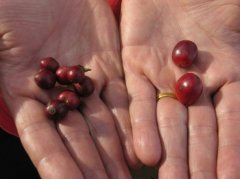What is organic coffee beans?
In many parts of the world, growers use pesticides to control the growth of coffee pests, and moist and foggy coffee at high altitudes are more vulnerable to fungi, so growers often use pesticides to treat them. Many people believe that coffee can be called organic coffee as long as synthetic pesticides, herbicides and chemical fertilizers are not used during its growth. In fact, it can be called organic coffee only if it has been certified by a third party (except coffee producers and buyers).

Organic Coffee Organic Coffee and authorized Organic Coffee Certified Organic Coffee is licensed by a third party and is grown without chemical raw materials without pesticides, pesticides, herbicides and artificial food additives during the growth of coffee trees. The detection, planting, cultivation, harvesting and production of soil water quality must meet the organic conditions and the process must be strictly controlled. It is a high-quality coffee produced in harmony with nature, which is of great benefit to health and environmental protection.
Only a small part of the world's coffee is truly organic certified coffee, because the certification process takes a long time, about three years. And such a deal would reduce coffee production by as much as 50%. So when coffee growers decide to do organic certification, it means that a time-consuming and costly investment begins.
Characteristics of organic coffee:
Organic coffee does not use any insecticides or other chemicals to treat diseases and insect pests or cultivation problems, but uses natural methods, such as natural composting, hedgerow, pruning, etc., to maintain the growth of coffee trees. Use all-natural biological control methods in pest control, such as planting protective trees, and using a variety of other natural farming techniques to ensure the health of coffee trees. Because the sustainability of land, water and the natural ecological environment is an active concern of the organic coffee industry. Organic high-quality coffee is a masterpiece of heaven, earth, and man-weather, soil, and love. It takes five years for a coffee tree to blossom and bear fruit. A pound of coffee needs about 4000 coffee beans, which are harvested manually. Each coffee tree harvests only enough coffee fruit a year to produce a pound of roasted beans, which is rare.
Important Notice :
前街咖啡 FrontStreet Coffee has moved to new addredd:
FrontStreet Coffee Address: 315,Donghua East Road,GuangZhou
Tel:020 38364473
- Prev

Boutique Coffee Common sense Robusta coffee beans you don't know
People always habitually look at things in dichotomy, good and bad, good and evil, good and bad. The same is true in the world of coffee. Arabica coffee beans are always classified as good, while its distant relative, Robusta, is often classified as bad. We might describe it this way, if Arabica is a gift from an angel.
- Next

Reasons for choosing organic coffee beans in the common sense of fine coffee
1. Protect the next generation: reduce exposure to carcinogenic chemicals such as pesticides and herbicides. two。 Prevent soil exhaustion: according to the soil Conservation Society, soil loss is seven times higher after chemicals are used and plants that nourish the soil are destroyed. 3. Energy conservation: modern farming is suitable for planting and harvesting crops made of petroleum artificial fertilizers. 4. To chemical drugs
Related
- Beginners will see the "Coffee pull flower" guide!
- What is the difference between ice blog purified milk and ordinary milk coffee?
- Why is the Philippines the largest producer of crops in Liberia?
- For coffee extraction, should the fine powder be retained?
- How does extracted espresso fill pressed powder? How much strength does it take to press the powder?
- How to make jasmine cold extract coffee? Is the jasmine + latte good?
- Will this little toy really make the coffee taste better? How does Lily Drip affect coffee extraction?
- Will the action of slapping the filter cup also affect coffee extraction?
- What's the difference between powder-to-water ratio and powder-to-liquid ratio?
- What is the Ethiopian local species? What does it have to do with Heirloom native species?

